Psychology
Chewing Gum Stigma
In Oct 2013, the chewing gum company Beldent gathered five sets of identical twins. In each set, one twin was instructed to chew gum while the other sat motionless. Visitors to the Buenos Aires Museum of Contemporary Art were then asked questions about the twins.Their answers indicated that 73 percent of people had a more favorable impression of the gum chewing twins. Beldent claimed that this disproved the "chewing gum stigma."
Though I disagree. I think gum chewing does turn off some people. What the experiment showed was that there's an even greater stigma attached to being expressionless, showing no emotion at all
Posted By: Alex - Tue Dec 03, 2019 -
Comments (0)
Category: Experiments, Psychology, Candy
Rent a Conversation
In 1973, entrepreneurs Richard and Christine Braunlich launched a business called Conversation. The idea was that it would allow people to pay to have a conversation with an expert "conversationalist." $5 for the first half-hour, and $3 for each additional half-hour. Some details from the SF Examiner (Feb 11, 1973):So far, however, the talkers have been few and far between — only about 40 customers have dropped in since Conversation opened.
About 60 percent of the customers have been women, the Braunliches report, and they talk about subjects ranging from poetry to small family problems.
Sitting in one of 14 tiny booths, customers can talk to one of 20 employees, who are called, appropriately enough, conversationalists.
And more details from the Moline Dispatch (Feb 13, 1973):
"She left her two kids at a movie and was here when the door opened," he said. "She just wanted to chat with somebody alive, warm and wiggling. Boy, did she want to talk."
Another woman explained that her husband was a nice guy but boring, and she needed to converse with somebody else once in a while...
"Lots of people with problems don't need professional help, but they do need to talk them over," Devendorf said. "They can go to the hairdresser, a bar or a coffee shop, but some are too shy."
At Conversation, persons with serious psychological difficulties are referred to professionals.
Evidently the business didn't succeed.
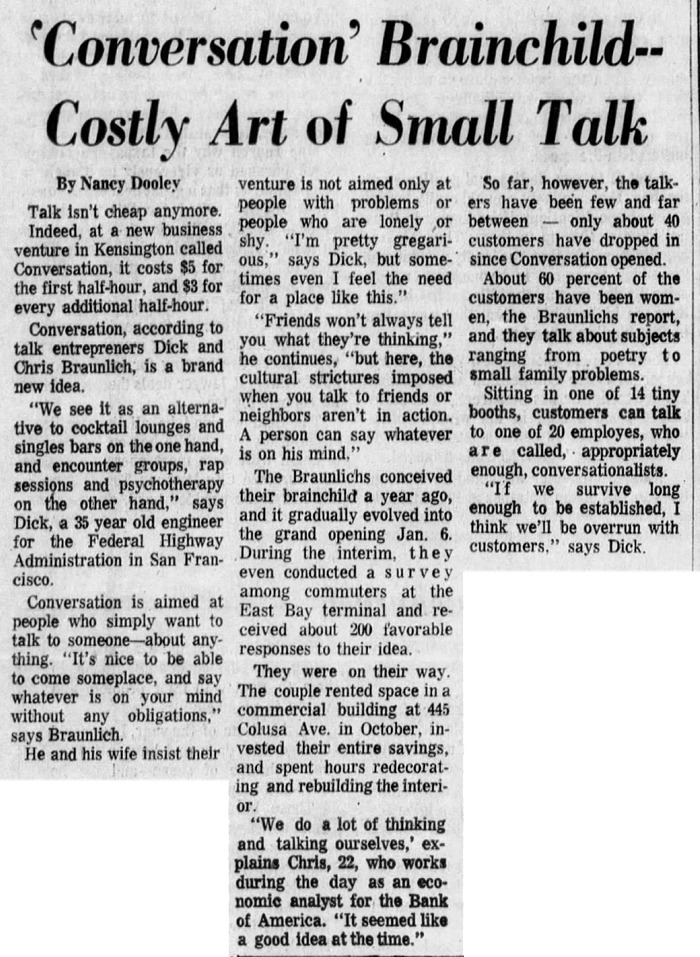
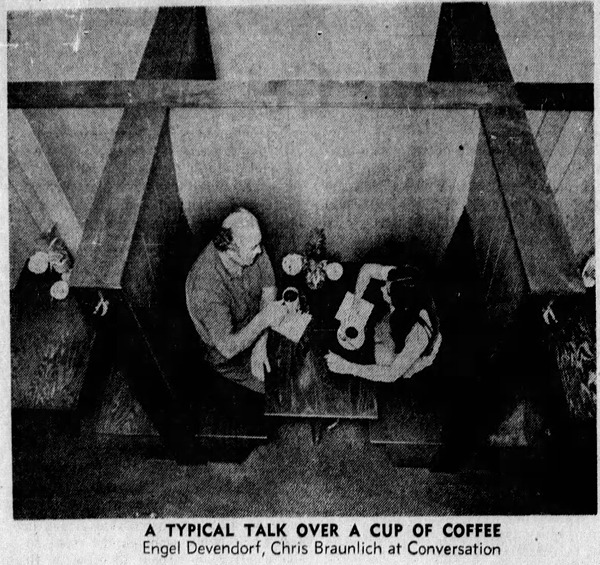
San Francisco Examiner - Feb 11, 1973
Posted By: Alex - Tue Oct 15, 2019 -
Comments (3)
Category: Business, Jobs and Occupations, Psychology, 1970s
The man hanging from ceiling
Scholarpedia defines inattentional blindness as "the failure to notice a fully-visible, but unexpected object because attention was engaged on another task, event, or object."One of the classic examples of this is provided by the Invisible Gorilla experiment, in which test subjects were asked to watch a video showing a group of people passing a basketball back and forth. Asked to count the number of times the ball was passed, half completely failed to notice that a man wearing a gorilla suit walked through during the middle of the scene.
A recent viral video provides another example. Popular Youtuber Sushi Ramen Riku tied himself to the ceiling of his grandmother's apartment and waited to see how long it would take for her to notice him. Even though he's perfectly visible to her the entire time, in her peripheral vision, she simply doesn't notice him, for over ten minutes. Evidently she didn't expect her grandson to be strapped to the ceiling.
Posted By: Alex - Sat Aug 03, 2019 -
Comments (5)
Category: Video, Psychology
Dessert Stomach
I’ve been saying for years that there’s always room for dessert, because dessert goes to a different part of your stomach. I feel vindicated to find out that there is some scientific basis to this claim. From the Huff Post:"A major part of the reason is a phenomenon known as sensory specific satiety. Basically, this is what we experience when we eat one food to fullness. Our senses tell us we are no longer wanting to eat any more of that specific food. In other words, we are full," Keast told The Huffington Post Australia.
"Part of the response is actually sensory boredom -- the food that excited us with promise of flavour delights is now boring. We are getting satiated, but combine this with the fact that our flavour sensing system is overloaded with the food's flavour helps us stop eating.
"Then you present a dessert, a new flavour experience, a different profile to what we are bored with. It may look and smell good and (from experience) we know sweet is appealing. No more boredom with the food and the anticipation creates appetite -- hence the dessert stomach."
In Japan, this phenomenon is called Betsubara. And some Japanese research suggests that the shape of your stomach can actually change when presented with dessert.
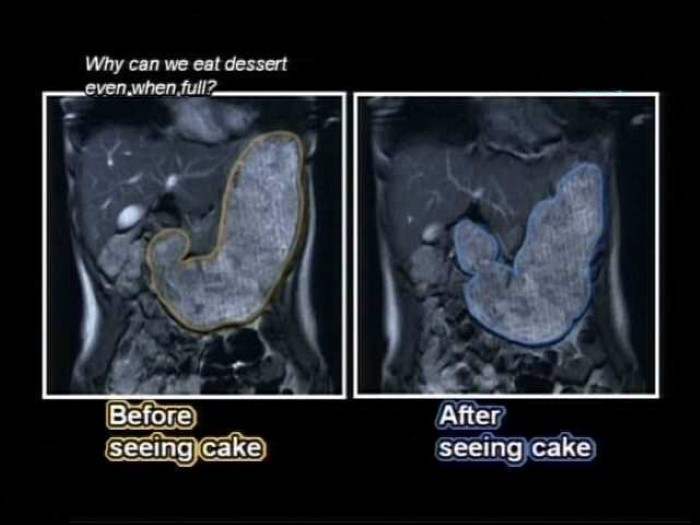
Posted By: Alex - Sat Jul 27, 2019 -
Comments (0)
Category: Food, Psychology
The Solitude Experiment of Mr. Powyss
Circa 1793, a Mr. Powyss of Lancashire apparently decided to conduct an unusual psychological experiment by paying a man to live in his basement, in complete solitude, for seven years.Information about this experiment is hard to find. A brief news item appeared about it in 1797:

The Annual Register... for the year 1797
A news story 30 years later reported that the subject of the experiment had emerged after seven years apparently no worse for wear. Or, at least, he had "absolutely accomplished it":

Given the lack of info, I suspect that the entire story might be an urban legend — one of those fake news stories that often made their way into early magazines and newspapers. However, the story has inspired author Alix Nathan to use fiction to fill in the blanks... imagining what might have happened in her recent novel The Warlow Experiment. As reported by the Guardian:

Posted By: Alex - Fri Jul 19, 2019 -
Comments (3)
Category: Experiments, Psychology, Eighteenth Century
Sympathetic Vomiting
An outbreak of mass vomiting at a school in North Carolina is being attributed to some kids getting upset stomachs from eating a combination of fruit juice and spicy chips, and then a bunch of other kids being triggered into “sympathetic vomiting.” That's when people vomit in response to seeing other people vomit. According to wisegeek.com, biologists suspect that the phenomenon has its roots in our evolutionary history:Other cases of sympathetic vomiting occasionally make headlines, such as in 2014 when a flight was forced to make an emergency landing after one person's vomiting caused five other people to do likewise.
Posted By: Alex - Fri Mar 29, 2019 -
Comments (4)
Category: Psychology, Body Fluids, Stomach
The Lemon-Juice Bandits
In January 1995, Macarthur Wheeler and Clifton Johnson robbed a bank in Swissvale, Pennsylvania. However, they had a plan to avoid detection: they rubbed lemon juice on their faces. Their reasoning was that lemon juice can be used to make invisible ink, so surely it would conceal their faces from surveillance cameras as well. They even tested this hypothesis by taking polaroid pictures of each other smeared with lemon juice, and it seemed to work.Unfortunately, they showed up just fine on the bank's cameras, and they were identified and arrested several months later when the footage of the robbery was broadcast on a local news show.
This odd crime has an interesting postscript. The psychologists David Dunning and Justin Kruger of Cornell University read about it, and it inspired them to start thinking about the problem of stupidity: this being that stupid people often don’t realize they’re stupid. In fact, they think they’re quite smart, which leads them to do incredibly dumb things. This phenomenon (of dumb people not being able to recognize the limits of their competence) is now known as the Dunning-Kruger Effect. In the journal article in which they introduced the concept, Dunning and Kruger cited the lemon-juice bandits as their inspiration.

Tyrone Daily Herald - Jan 8, 1996

Pittsburgh Post Gazette - Mar 21, 1996
Posted By: Alex - Tue Mar 26, 2019 -
Comments (4)
Category: Stupid Criminals, Psychology, 1990s
Hangovers Due to Guilty Conscience
In 1973, Professor Robert Gunn advanced this theory.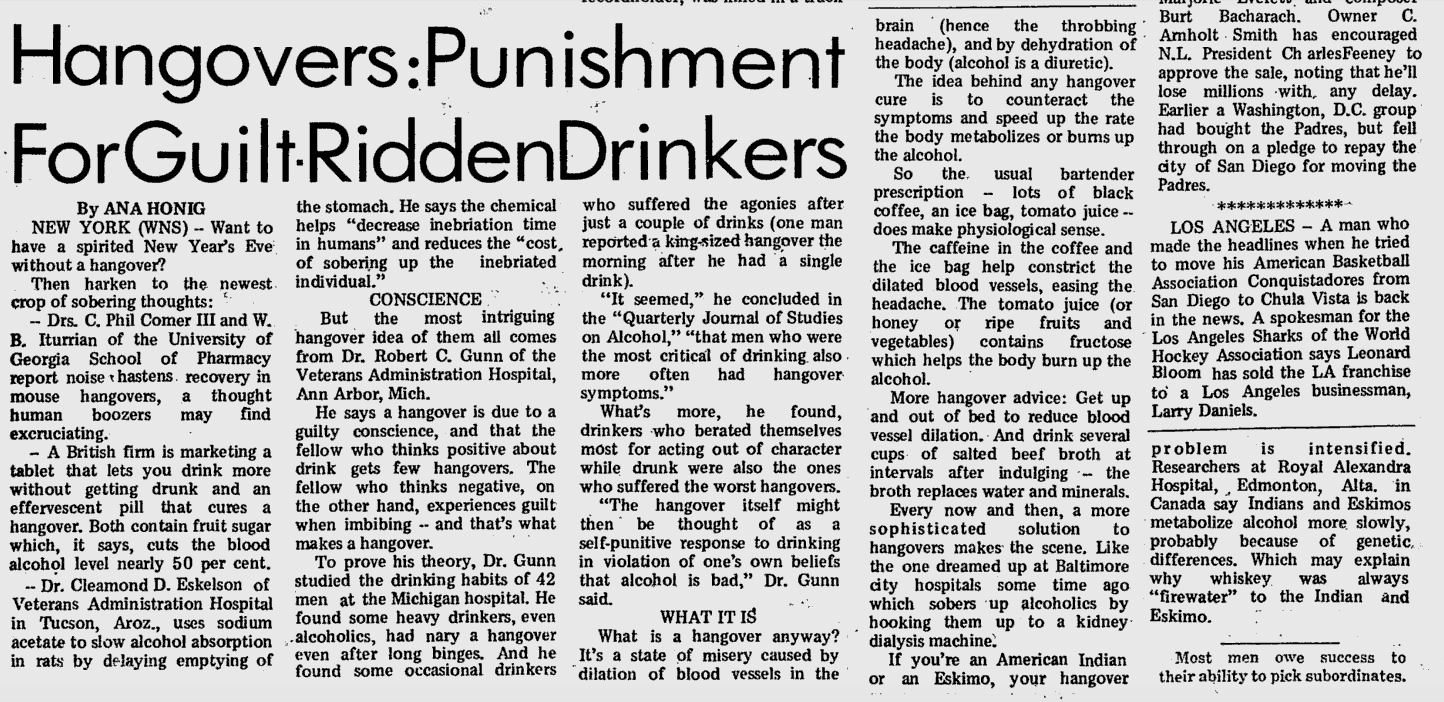
Twenty years later, he was still pursuing the idea, as you can see in the scientific paper at the link.
To reappraise a prior study of hangover signs and psychosocial factors among a sample of current drinkers, we excluded a subgroup termed Sobers, who report "never" being "tipsy, high or drunk." The non-sober current drinkers then formed the sample for this report (N = 1104). About 23% of this group reported no hangover signs regardless of their intake level or gender, and the rest showed no sex differences for any of 8 hangover signs reported. Using multiple regression, including ethanol, age and weight, it was found that psychosocial variables contributed independently in predicting to hangover for both men and women in this order: (1) guilt about drinking; (2) neuroticism; (3) angry or (4) depressed when high/drunk and (5) negative life events. For men only, ethanol intake was also significant; for women only, being younger and reporting first being high/drunk at a relatively earlier age were also predictors of the Hangover Sign Index (HSI). These multiple predictors accounted for 5-10 times more of the hangover variance than alcohol use alone: for men, R = 0.43, R2 = 19%; and for women, R = 0.46, R2 = 21%. The findings suggest that hangover signs are a function of age, sex, ethanol level and psychosocial factors.
Posted By: Paul - Sun Feb 10, 2019 -
Comments (1)
Category: Science, Experiments, Psychology, 1970s, 1990s, Pain, Self-inflicted and Otherwise, Alcohol
Hot Dogs vs Hamburgers
According to a study conducted by Dr. Leo Wollman (and reported in Omni magazine in 1980), one's preference for hot dogs or hamburgers when going out for a quick lunch has a deeper significance:"The people who eat hot dogs usually grab it and go," he said. "Hamburger eaters take more time. They're better dressed executive types, used to making decisions—well done, rare, ketchup or mustard."
I like both hot dogs and hamburgers, but if I was pressed for time I'd probably grab a hot dog over a hamburger. However, I don't match Wollman's hot-dog personality type at all. So I wouldn't put much stock in his results. And digging into his bio a bit further, it doesn't seem that he was exactly known for his credibility as a researcher.
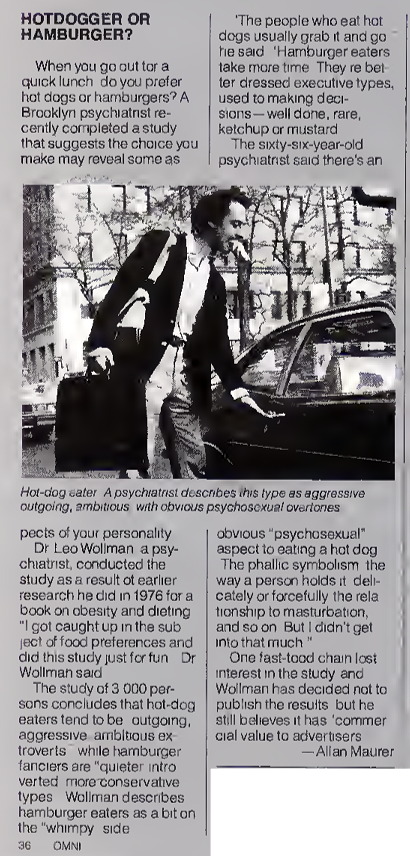
Omni - July 1980
Posted By: Alex - Sat Dec 01, 2018 -
Comments (7)
Category: Food, Junk Food, Psychology
Expando-Vision
Introduced in 1983 by Stimutech. It was a device that could flash subliminal messages on your TV screen as you watched TV. The maker emphasized the ways this could be put to use for self-help (weight-loss, stop smoking, stop drinking, etc.). But they did sell a "Sexual Invitation" program that surreptitiously flashed messages of seduction: "Sex is OK, Let us make love, I am OK, We share sexually, Let us kiss, Let us caress, Let us be naked, We explore bodies, Let us be together.”
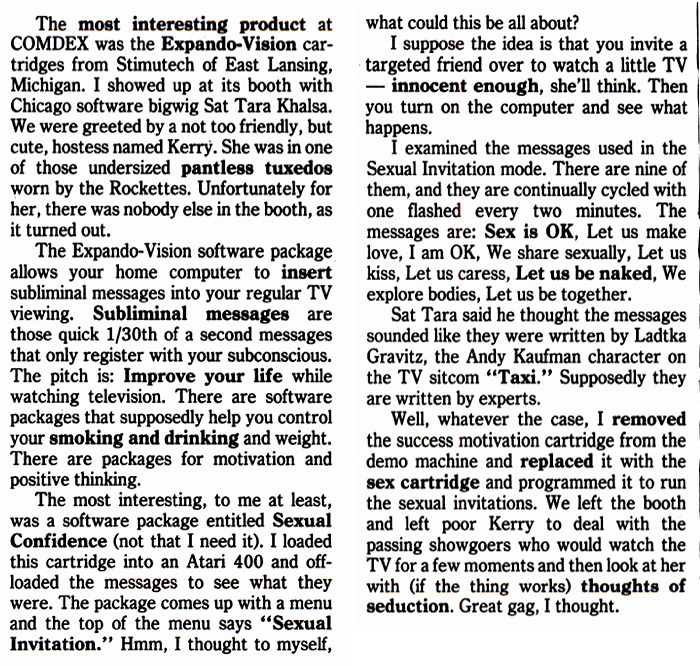
John Dvorak, InfoWorld - Dec 26, 1983

Lansing State Journal - Dec 4, 1983
Posted By: Alex - Fri Oct 19, 2018 -
Comments (2)
Category: Innuendo, Double Entendres, Symbolism, Nudge-Nudge-Wink-Wink and Subliminal Messages, Technology, Psychology, 1980s

| Who We Are |
|---|
| Alex Boese Alex is the creator and curator of the Museum of Hoaxes. He's also the author of various weird, non-fiction, science-themed books such as Elephants on Acid and Psychedelic Apes. Paul Di Filippo Paul has been paid to put weird ideas into fictional form for over thirty years, in his career as a noted science fiction writer. He has recently begun blogging on many curious topics with three fellow writers at The Inferior 4+1. Contact Us |




